Nixon Moreno | |
|---|---|
| Born | February 9, 1974 |
| Alma mater | Los Andes University |
Nixon Moreno (February 9, 1974) is a Venezuelan who studied at Los Andes University (ULA); he was leader of the M-13 student group, and former president of the Student Federation.
Nixon Moreno | |
|---|---|
| Born | February 9, 1974 |
| Alma mater | Los Andes University |
Nixon Moreno (February 9, 1974) is a Venezuelan who studied at Los Andes University (ULA); he was leader of the M-13 student group, and former president of the Student Federation.
Moreno has been accused of an attempt to rape a local police woman, Sofía Aguilar, and leaving several policemen wounded in a confrontation during a student protest in 2006. The protest was led by Moreno against a court decision that suspended the election of the Student Federation. [1] Venezuelan justice has been looking for Moreno since then.
Aguilar identified Moreno as her attacker in a statement to state media (Venezolana de Television). [2] In June, 2006, a National Assembly commission, presided by Deputy Obdulio Camacho, concluded that the accusations were untrue. [3] The ULA President, other authorities, and TV footage indicate that at the hour of the events reported by Aguilar, Moreno was in a clinic at another end of the city, receiving treatment for a face wound caused by a plastic shot (which Aguilar did not mention).
On October 7, 2008, Aguilar said in a TV interview [4] [5] that she was "humiliated by the attitude the Church has taken" by granting asylum to Moreno "without a Church authority asking me first about the events," but she "now does not want the Church to ask anything." In September, 2008, Aguilar was postulated as candidate for the Mérida State Legislature by the group Tupamaro, which firmly supports Chávez's government. Chávez opponents claim Aguilar is being paid to incriminate Moreno.
Moreno is the only person indicted for the accusations, even though many other persons were implicated. He has been publicly presumed guilty by Chávez. For example, in his Annual Address of the Presidency at the National Assembly in January 2008, [6] [7] Chávez said, "Mr Ambassador... you have a delinquent [Moreno] protected there [in the Embassy]; you should turn him to the authorities."
On March 13, 2007, he asked for asylum in the Apostolic Nunciature (Holy See) to avoid capture. [8] On November 12, 2007, Moreno was granted a ULA degree as a politician. The graduation ceremony was performed at the nunciature. Asylum was granted confidentially on June 11, 2008 and made public in September, 2008. [9] Chávez's government did not issue the corresponding safe conduct for Moreno to travel out of Venezuela.
On March 9, 2009, Moreno left the Apostolic Nunciature and is currently living in Peru, where he was granted political asylum.
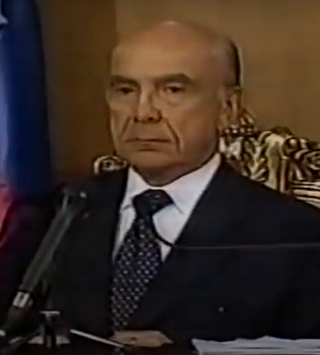
Pedro Francisco Carmona Estanga is a former Venezuelan business leader who was briefly installed as acting president of Venezuela in place of Hugo Chávez, following the attempted military coup in April 2002.
The University of the Andes is the second-oldest university in Venezuela, whose main campus is located in the city of Mérida, Venezuela. ULA is the largest public university in the Venezuelan Andes, having one of the largest student bodies in the country.
Universidad de Los Andes Televisión, abbreviated ULA TV, was a television station in Mérida, Mérida, Venezuela, that was owned by the Universidad de Los Andes. The station began broadcasting in 1999 and was shuttered by the National Commission of Telecommunications (CONATEL) on June 15, 2017.

María Corina Machado Parisca is a Venezuelan opposition politician who served as an elected member of the National Assembly of Venezuela from 2011 to 2014. Machado was the founder and former leader of the Venezuelan volunteer civil organization Súmate, alongside Alejandro Plaz. In 2018, she was listed as one of BBC's 100 Women.

Manuel Antonio Rosales Guerrero is a Venezuelan educator and politician, current governor of Zulia. He was the most prominent opposition candidate in the 2006 presidential election, losing to incumbent Hugo Chávez. He served as a congressman, mayor, and governor, but in April 2009, stepped down as Mayor of Maracaibo when he was charged with corruption in Venezuela and fled to Peru. Rosales denies the charges, and was granted political asylum in Peru.
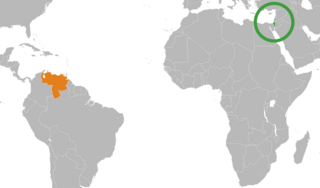
Israeli–Venezuelan relations refer to foreign relations between Israel and Venezuela. Both countries have no formal relations since 2009. Canada serves as Israel's protecting power in Venezuela through its embassy in Caracas, while Spain serves as Venezuela's protecting power in Israel through its embassy in Tel Aviv.

Mérida, officially known as Santiago de los Caballeros de Mérida, is the capital of the municipality of Libertador and the state of Mérida, and is one of the main cities of the Venezuelan Andes. It was founded in 1558 by Captain Juan Rodríguez Suárez, forming part of Nueva Granada, but later became part of the Captaincy General of Venezuela and played an active role in the War of Independence.
Eligio Cedeño is a, president of CEDEL Group, Venezuela. He is in the United States, having been released on bail from charges in Venezuela of circumventing government currency rules to gain U.S. dollars. Over the next year prosecutors repeatedly failed to turn up for court dates, leading to accusations that the case was being strung out due to a lack of evidence. The United Nations' Working Group on Arbitrary Detention in September 2009 declared Cedeño's detention arbitrary partly as a result, and judge María Lourdes Afiuni would release him on this basis. Due to her decision to free Cedeño, Judge Afiuni was herself jailed.
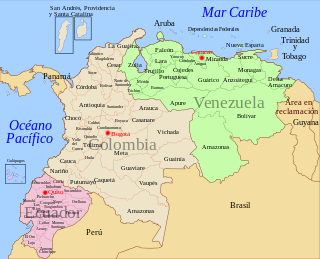
The 2008 Andean diplomatic crisis was a diplomatic stand-off between the South American countries of Ecuador, Colombia and Venezuela. It began with an incursion into Ecuadorian territory across the Putumayo River by the Colombian military on March 1, 2008, leading to the deaths of over twenty militants, including Raúl Reyes and sixteen other members of the Revolutionary Armed Forces of Colombia (FARC). This incursion led to increased tension between Colombia and Ecuador and the movement of Venezuelan and Ecuadorian troops to their borders with Colombia.

A constitutional referendum was held in Venezuela on 15 February 2009 for voters to approve or reject Amendment No. 1 of the constitution, which abolished term limits for the offices of President, state governors, mayors and National Assembly deputies.
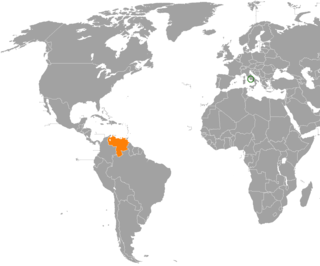
Holy See–Venezuela relations are foreign relations between the Holy See and Venezuela. Both countries established diplomatic relations in 1869. The Holy See has a nunciature in Caracas. Venezuela has an embassy in Rome.
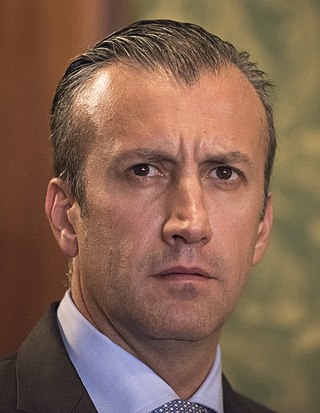
Tareck Zaidan El Aissami Maddah is a Venezuelan politician, who served as the vice president of Venezuela from 2017 to 2018. He served as Minister of Industries and National Production since 14 June 2018, and as Minister of Petroleum from 27 April 2020 until 20 March 2023. He previously was Minister of the Interior and Justice from 2008 to 2012, Governor of Aragua from 2012 to 2017, and the vice president of Venezuela from 2017 to 2018. While holding that office, El Aissami faced allegations of participating in corruption, money laundering and drug trafficking. In 2019, U.S. Immigration and Customs Enforcement (ICE) added El Aissami to the ICE Most Wanted List, listed by the Homeland Security Investigations unit. El Aissami, who was among the power brokers in the Nicolás Maduro regime, resigned on 20 March 2023 amid a widening corruption probe.

Génesis Cristina Carmona Tovar was a Venezuelan fashion model, beauty queen, and college student who was killed while protesting against the government of Venezuela during the 2014 Venezuelan protests. She later became a symbol of protest against the Nicolás Maduro government during the time of demonstrations in the country.

Colectivos are far-left Venezuelan armed paramilitary groups that support the Bolivarian government, the Great Patriotic Pole (GPP) political alliance and Venezuela's ruling party, the United Socialist Party of Venezuela (PSUV). Colectivo has become an umbrella term for irregular armed groups that operate in poverty-stricken areas.

Movimiento Estudiantil is a Venezuelan student movement started in 2007, made up of students who organized in opposition to the government of President Hugo Chávez. According to several analysts, it had a decisive effect on the rejection of the 2007 Venezuelan constitutional referendum.

The 2014 Venezuelan protests began in February 2014 when hundreds of thousands of Venezuelans protested due to high levels of criminal violence, inflation, and chronic scarcity of basic goods because of policies created the Venezuelan government. The protests have lasted for several months and events are listed below according to the month they had happened.
Antisemitism in Venezuela has occurred throughout the history of the Jews in Venezuela. However, under the presidencies of both Hugo Chávez and Nicolás Maduro, allegations of antisemitism grew following actions and statements by the Venezuelan government, while also occurring in public incidents. The Bolivarian government would also use the words of "Jewish" and "Zionist" interchangeably in order to avoid accusations of antisemitism.

2015 protests in Venezuela began in the first days of January primarily due to shortages in the country, with the first massive demonstration occurring on 23 January, on the anniversary of the 1958 coup d'etat against dictator Marcos Pérez Jiménez. The series of protests originally began in February 2014 when hundreds of thousands of Venezuelans protested due to high levels of criminal violence, inflation, and chronic scarcity of basic goods because of policies created the Venezuelan government. As of January 2015, over 50 people had been arrested for protesting. The protests are listed below according to the month they had happened.
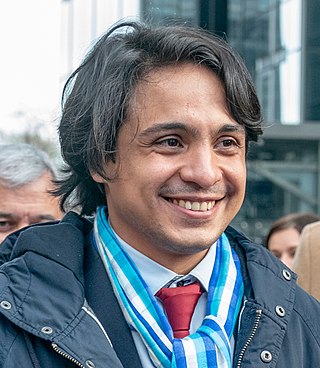
Lorent Enrique Gómez Saleh is a Venezuelan activist. Since 2011, Saleh has participated in several activities in defense of human rights and has been repeatedly detained by the Venezuelan authorities. In 2014, he was deported from Colombia and handed over to officials of the Bolivarian Intelligence Service (SEBIN). Until 2018, he was being held in La Tumba, in Plaza Venezuela, Caracas, during which time his hearing had been postponed 52 times. On 12 October 2018, he was released by the Venezuelan authorities and exiled to Spain, where he arrived the next day after landing at the Madrid–Barajas Airport.